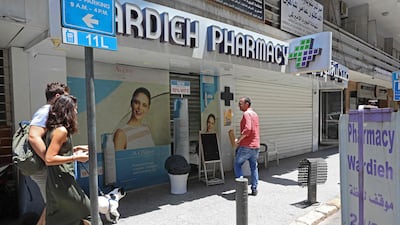Lebanon’s power blackouts worsened on Friday as the state-owned power company shut two electricity plants after running out of fuel, while pharmacies closed to protest against medicine shortages.
Electricite du Liban (EDL) said power generation at the Deir Amar and Zahrani plants, which supply up to 60 per cent of the country’s electricity, will resume only when two fuel shipments off Lebanon’s coast are unloaded. The delivery has been halted over delayed payments as the central bank has scaled down its subsidies of fuel imports in recent weeks amid dwindling foreign currency reserves.
The shortage of diesel, needed to power private generators that compensate for state power rationing, also worsened, leading to power cuts for more than nine hours a day across Lebanon.
The blackouts have sparked demonstrations and led to internet outages and water supply disruption, as pumps cannot function without electricity from diesel-powered generators.
On Friday, several state-affiliated water utilities announced increased rationing because of the diesel shortage.
Petrol has also become increasingly scarce in recent weeks. Long queues at petrol stations across the country have created a black market for those who can afford to pay three or four times the official price.
The worst economic and financial crisis to grip the small Mediterranean country in decades also prompted many pharmacies to close shop on Friday as subsidised essential medicines disappeared from shelves, as delayed payments by the central bank to importers halted fresh supplies.
Shortages of basic necessities have led to scuffles over limited stocks and prompted Lebanon’s caretaker prime minister to warn the international community that the crisis could spill beyond its borders. Hassan Diab said Lebanon, which is home to more than 1.5 million refugees, was at risk of collapsing under the weight of the crisis.
The international community, which is providing direct aid to the impoverished population and security forces, insists that financial support to the government is contingent on the formation of a new cabinet that commits to the implementation of reforms to fight corruption.
Lebanon has been without a fully functioning Cabinet since Mr Diab submitted his resignation after the massive blast at Beirut port last August.
The explosion, which killed more than 200 people and destroyed thousands of properties across the city, compounded a crisis unfolding since late 2019. Lebanon’s national currency has lost more than 95 per cent of its market value, plunging half of the country’s population into poverty.
The Lebanese pound was trading at a record low of 19,000 to the dollar on Friday, compared with the official rate of 1,515.
Lebanon remains without a government as President Michel Aoun remains at loggerheads with prime minister-designate Saad Hariri over the incoming government’s make-up and reform agenda.
The political rift has deepened in recent weeks against the backdrop of regional tensions between Iran and its rivals, prompting Mr Hariri to consider stepping down.


